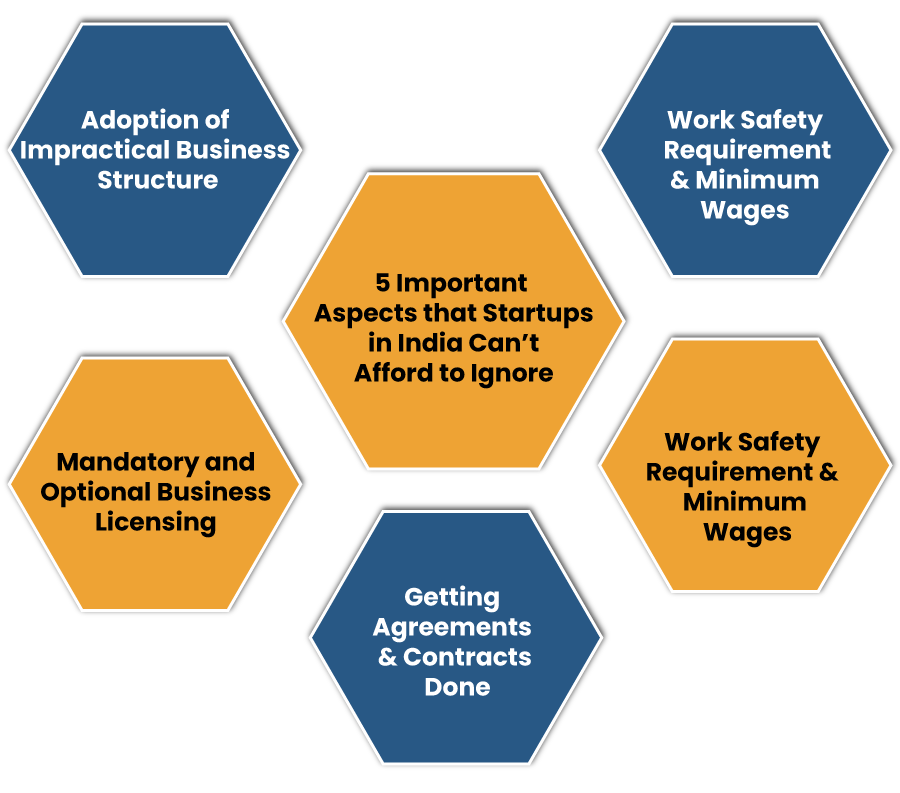Startups in India often find themselves trying several tactics when it comes to addressing different requirements from time to time. While IT & HR activities are taken care of by an internal team of dedicated employees, the same does not go with other departments. The third-party service provider often oversees other aspects. Other organizations often assist them in focusing on core competency from firm registration to handling account activities and even filing GSTR. Most startups in India commence their business journey by overlooking the following aspects that hurt them drastically and hinder their growth.


Adoption of Impractical Business Structure
We have seen businesses grappling with selecting the right business structure that meet their long list of requisites. Each business structure has its pros and anomalies with a different set of legal connotations involved.
Startups in India can opt for the following legal structures and start their business journey within the legal framework. You can register as a legal entity under the Companies Act. The following structure can be chosen by the startups in India:-
Private Limited Company
A Private Limited Company is a type of company regulated under the provision of the Company Act 2013. A minimum of 2 members is required to incorporate such a company. The liability of the members of a Privately-held entity is limited to the amount of share held by its shareholders.
One Person Company Registration (OPC)
Just like a private limited company, OPC is also regulated as per the provision of the Company Act 2013. One Person Company means a company owned by a single person. In legal terms, OPC refers to a company served by one shareholder as its member.
Most startup India are conservative from an ownership standpoint as they seek complete ownership over their business operation. In view of this, OPC is a perfect business structure for such kind of startups.
Public Limited Company
A public limited company refers to a joint-stock company, and it is regulated as per the provision of the Companies Act, 2013. Unlike privately held entities, there is no limit on the number of members in the publically-held organization.
Limited Liability Partnership
A Limited Liability Partnership means an establishment where a minimum of two members are required, and there is no restriction on the maximum. The members serving such a business structure do not possess unlimited liability.
Section 8 Company
A Section 8 company is primarily a non-profit establishment. Such companies serve charitable & not-for-profit purposes. It is identical to society and trust in which the profits are allocated for advocating the company’s goals and no dividend payable to the shareholders or the company’s members.
Sole Proprietorship
It is registered when the business operation is handled by a single person and involves less compliance. Though registered, it continues to serve as an informal structure instead of a legal entity. Upcoming entrepreneurs and Startups in India are more inclined towards this business structure.
Partnership Firms
This business structure is driven by more than one person. There are three ways to do so; general partnership or limited liability partnership (LLP), where the latter act as body corporate rendering all the legal rights. Select the right business form involves considering the type and size of your business and how you envisage its growth.
Generally, a sole member often goes with the proprietorship or an OPC business structure due to ease of operation and less compliance.
Mandatory and Optional Business Licensing
Some businesses seek government-based licenses to commence their journey—for example, FSSAI licensing for conducting food-related business. Startups in India require adopting cautious approach while meeting the licensing prerequisites to avert any contradiction with the legal houses in the future. It’s impractical to survive in a business environment without proper licensing and permission. Ensure your startup has all the mandatory licenses at the disposal before initiating the business operation.
If possible, go for the expert help to avail the pinpoint information for the same. Be precise with the documentation works as the margin of error here is next to negligible. One such document is the certificate of incorporation based on which other licenses can be sought.
Getting Agreements & Contracts Done
Such operational dependencies will lead to an agreement that entails working policies & norms for job profiles laid down by startups. An employment contract consolidates work commitments, details regarding salaries, deliverables in addition to the ESOP details if offered. If you are about to step into the business world, then getting clarity on aspects above & having a contract would help.
Eventually, this will prevent the danger of uncertainty to help scale efficiently. Although vendor agreement does not stand compulsory for business, it is best to have those in place too. This is to safeguard business-related transactions & encourage long-term synergies to walk in tandem with the symbiotic demand and supply relationship.
Also, there are trends among new firms these days wherein a shareholder and co-founder agreement is done. Having such agreements will add clarity to the management by distinguishing the business-specific roles of co-founders and others.
Read our article:Know the Complete Rundown of Documents Required For Startup India Registration
Work Safety Requirement & Minimum Wages for Startups in India
The Ministry of Labor and Employment[1] has underpinned safety, health & environment regulations for different establishment. If your company is engaged in hazardous substance production, or if workers are exposed to a specific chemical, then ensuring conformity with such standards is compulsory. Don’t put your business in danger by overlooking such set standards.
On the other hand, the Payment of Minimum Wage Act, 2005 talks about the minimum wage payment on account of industry norms. Again, startups employing workers for an assortment of jobs must fulfill those criteria to keep in line with the compliances. This is because startups are accountable for its workforce’s health & safety during the time of operation.
It is advisable to conduct a risk assessment that assists in pinpointing potential hazards & measures to fight those.
Protection of Intellectual Property
Intellectual properties are valuable assets for any organization. Startups must take relevant measures to keep them secured. The most common IP are:-
Patents
Patents safeguard products/processes that are unique, inventive, and have industrial utility. For instance, a computer hardware company must file a patent if they have invented a groundbreaking system for cooling the motherboard.
Trademarks
Trademarks provide legal protection to the brand name, sign, logo, etc. These assets are subjected to counterfeiting owing to their substantial value in the market. Unlike a patent, Trademark is easy to get and provides continual protection by offering exclusive rights to the owner.
Copyrights
Copyrights are very important for startups that have businesses related to creative, artistic works. A multimedia company must register the songs/ movies it creates.
IP protection is essential for startups in India due to the following reasons.
- It provides the startup with comprehensive protection against illegal entities and legit legal support that prevent others from misusing the brand.
- It maximizes startup security by safeguarding it against the act of counterfeiting and preventing any duplicated version of the product from entering the market.
- Can attract overseas investors & clients intending to acquire your brand at a later stage. Also, licensing or assigning others to leverage your IP can result in higher profits.
Conclusion
Staying in compliance with government norms would keep you ahead of the curve and ensure your business’s seamless running. A prolonged commitment to meet the compliances can pave down the roadmap of success for your startups. Most startups in India often found themselves in a dilemma of comply with various requirements underpinned by the government authority. If you are about to start your business journey and confronting pre-launch issues then feel free to share your concerns with the CorpBiz’s associates.
Read our article:Benefits of Startup India Registration in India











